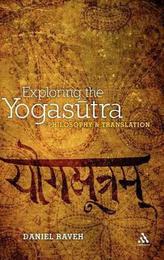
|
Exploring the Yogasutra: Philosophy and Translation
Hardback
Main Details
| Title |
Exploring the Yogasutra: Philosophy and Translation
|
| Authors and Contributors |
By (author) Dr Daniel Raveh
|
| Physical Properties |
| Format:Hardback | | Pages:184 | | Dimensions(mm): Height 234,Width 156 |
|
| Category/Genre | Oriental and Indian philosophy
Hindu sacred texts |
|---|
| ISBN/Barcode |
9781441146229
|
| Classifications | Dewey:181.452 |
|---|
| Audience | | Professional & Vocational | |
|---|
|
Publishing Details |
| Publisher |
Continuum Publishing Corporation
|
| Imprint |
Continuum Publishing Corporation
|
| Publication Date |
10 May 2012 |
| Publication Country |
United States
|
Description
Patanjali's Yogasutra is an ancient canonic Indian text composed in Sanskrit in the 3rd or 4th century. Belonging to a very different cultural milieu, this multi-layered text is philosophical, psychological and practical in nature. Offering a philosophical reading of Patanjali's Yogasutra, this book discusses themes such as freedom, self-identity, time and transcendence, and translation - between languages, cultures and eras. Drawing substantially upon contemporary Indian materials, it discusses for the first time classical yoga as reflected upon by Daya Krishna (1924-2007) with constant reference to Krishna Chandra Bhattacharyya's (1875-1949) studies in yoga philosophy. The genuine attempt on behalf of these two original thinkers to engage philosophically with Patanjala-yoga sets the tone of the textual exploration provided here. This book features a new annotated translation of the Yogasutra, and the author provides a useful background to the extensive Samkhya terminology employed by Patanjali. Daniel Raveh also offers a close reflection of the very act of translation, and the book concludes with suggestions for further reading and a glossary of central notions.
Author Biography
Daniel Raveh is Lecturer of Indian and Comparative Philosophy at Tel Aviv University, Israel.
Reviews'Thinking anew with Patanjali: this is a modern-day translation and meditation on the spiritual praxis and philosophy of the Yogasutras, the great ancient Indian classic. Daniel Raveh's refreshing book is, at the same time, a sensitive reflection on meaningful cross-cultural and cross-epochal translation which he sees as a process of creative transformation, a process inevitable for retaining significance.' -- Dr Mukund Lath, University of Rajasthan, Jaipur, India. 'Raveh's thoughtful reflections on the nature of translation, his investigation of five key themes: practice, dispassion, ignorance, clinging, and yogic knowledge, as well as his skilfully rendered new translation of the Yoga Sutra make this book indispensible reading for anyone with a serious interest in the study of classical Yoga.' -- Christopher Key Chapple, Doshi Professor of Indic and Comparative Theology, Loyola Marymount University, USA. 'As a philosophical work attempting to answer some questions that Patanjali's YS raises, it is a refreshing change from the recent trend of Yoga books dealing mainly with "physical-Yoga".' -- Dr. T.S. Rukmani, Professor and Chair in Hindu Studies, Concordia University, Canada 'Exploring the Yogasutra presents a new, engaging perspective on Patanjali from a philosophical point of view. It is a contribution invaluable for anybody interested in this authoritative source of Yoga theory.' -- Dr Yohanan Grinshpon, Department of Comparative Religion, The Hebrew University of Jerusalem, Israel 'Raveh undertakes an extraordinary clarification of the old, profound, paradoxical, often mysterious inward-seeking inwardness of the Yogasutra...Altogether, the book is a great didactic success in the translation of the thought and practice of one culture into the terms of another.' -- Ben-Ami Scharfstein, author of A Comparative History of World Philosophy: From the Upanishads to Kant, and Professor Emeritus of Philosophy, Tel-Aviv University, Israel
|